Mental disorders or illnesses are those conditions that affect the mood, thoughts, and overall behavior of an individual. The cause behind a mental condition can be biological or environmental, or a combination of both. Mental illnesses were on the rise even before COVID-19, after the pandemic and isolation combined with uncertainty, fear, and financial losses have worsened the situation.
Some common Mental Illnesses and Symptoms, as per Paul Haarman
Read ahead to find out the most common mental illnesses:
- Anxiety Disorders
Anxiety disorders have the largest impact on the human population. About 40 million US adults suffer from an anxiety disorder at least once in their lifetime.
Psychologists believe that a certain level of anxiety is necessary for productivity. However, people with anxiety disorders suffer from intense excessive and persistent worry and apprehension about day-to-day situations.
Like any other illness, these conditions subsequently affect a person’s well-being and productivity. Some common anxiety disorders are Generalized Anxiety Disorder, Obsessive-compulsive disorder(OCD), Panic Disorder, PTSD, and Social Anxiety.
Common symptoms of anxiety disorders:
- Restlessness
- Unexplained fear
- Increased heart rate.
- Breathing rapidly
- Sweating
- Trembling
- Fatigue
- Trouble concentrating
- Mood Disorders
Mood disorders primarily affect a person’s emotional state—people who might suffer from any type of mood disorder experience long periods of extreme emotional imbalance. The symptoms can be severe in many cases and disrupt the normal functioning of an individual. In most cases, effective therapy, antidepressants, lifestyle changes, and self-caring have proven effective in treatment.
Common Mood disorder symptoms:
- Long episodes of feeling sad
- Loss of appetite or overeating
- Sleeping too much or too less
- Difficulty concentrating
- Feeling of hopelessness
- Psychotic Disorders
Such disorders attack a person’s sense of reality. They can be caused because of biological factors, trauma, and a result of drug abuse. Some common psychotic disorders are Schizophrenia, Schizoaffective disorder, Delusional disorder, and Substance-induced Psychotic Disorder.
Common symptoms of psychotic disorders:
- Hallucinations
- Delusions
- Incoherent Speech
- Confusion
- Loss of interest in self-care and hygiene
- Cold behavior or emotional detachment
- Mood Swings
- Dangerous behavior
- Dementia
People suffering from this group of mental disorders have declined cognitive abilities or thinking skills. They can be severe enough to impair the everyday life of the patient.
Common dementia-related disorders are Alzheimer’s disease, Parkinson’s disease, Frontotemporal dementia, Huntington’s disease, and Wernicke-Korsakoff syndrome. Of these, Alzheimer’s disease affects more than 50% of all dementia cases.
Common symptoms are:
- Poor memory
- Planning day to day activities
- Problem carrying out simple day to day tasks
- Eating Disorders
These are recognized as unhealthy eating habits. In the United States alone, 20 million women and 10 million men have suffered from an eating disorder once in their life. In severe cases, they can result in serious health consequences. Common eating disorders are Anorexia nervosa, Bulimia nervosa, Binge eating disorder, etc.
Common symptoms include:
- Binge eating
- Excessive exercising
- Uncontrollable urge to vomit
- Dramatic weight loss
- Constant dieting
As per Paul Haarman, since many individuals now are prioritizing their mental health, it is important to understand the most prevalent mental disorders and their symptoms to efficiently manage your mental health during these unprecedented times.










